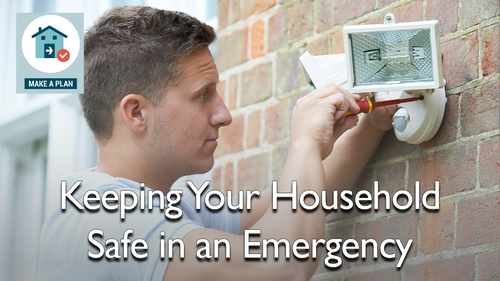Keeping Your Household Safe in an Emergency

A great way to think of emergency preparedness is as a three-pronged approach: home, work, and travel, all of which will have some degree of overlap. This article will focus on the home and specifically home security. Here are some ideas for you to consider in making your home as secure as possible:
Finally, remember to make the weapon of prayer your first response, not your last resort. The Lord is your protector, ultimately, and any steps you take in that role should be under His authority and subject to His direction. He is with you!
“So do not fear, for I am with you; do not be dismayed, for I am your God. I will strengthen you and help you; I will uphold you with my righteous right hand.” (Isaiah 41:10)
Next week’s topic: First Aid and Medicines
Blessings,
HF Preparedness Leadership Team
Action Steps:
NOTE: If you’re on the Telegram messaging app, please join our channel, “Consider the Ant,” with even more preparedness-related tips, information, insights, and news stories. https://t.me/ConsiderTheAnt
- External lighting: One of the easiest ways to create a higher level of safety is to have excellent exterior illumination. Most existing light fixtures can be modified or replaced to add a motion-activated element to optimize existing lighting.
Adding solar-powered lights at the end of driveways or other darker areas of the yard is an easy and affordable way to shed light on more poorly lit areas. Consider having several areas of solar-powered lighting if you do not have a generator to power the regular lighting if the electricity is out. - Security systems: Having and maintaining a security system is another good deterrent in keeping unwanted guests away. Often these systems are designed to contact emergency services on your behalf in the event of an emergency, be it fire or intruder. Security doorbells are very popular as well, which often feature a video element.
- Keeping doors and windows locked: Although this seems obvious, it is very easy to get lulled into a false sense of security. Locking doors and windows is the simplest way of increasing our level of safety. Consider adding additional locking bars or mechanisms to windows that are hidden away from view.
Replace the short screws in your door striker plate with longer, three-inch screws to make your door harder to force open. Perhaps you have basement windows that could benefit from having grates or decorative bars installed (obviously they will need to be able to open from the inside).
Utilizing your existing locks and deadbolts will go a long way in increasing your level of security. - Have a plan: Prior, proper planning . . . Having a plan is foundational to your levels of security; practicing that plan is equally as important. Have family discussions; have regular drills. What are our immediate steps if there is an emergency? Practice for all possible scenarios—fire, earthquake, Lehar, flood, or even intruder drills.
If evacuation is required, do you have a meeting place picked out? Which room in your home is the safest sheltering in place? Practicing these potential scenarios will create a “muscle memory” that will help propel you during the higher stress of an actual emergency. - Personal protection: Should you choose to utilize a force multiplier, firearm, knife, sword, ninja stars, or pepper spray, here are a couple of thoughts. Firstly, train, train, and then train again. This cannot be emphasized enough. If your plan includes a weapon of any sort, then you must train to a high level of efficiency before this item is included as a part of your planning.
As a 2nd Amendment advocate, this writer believes in the constitutional right to bear arms; however, the ability and skill to practice that right are not inherited, as the right itself is. We must build our skills to be able to exercise that right.
And secondly, storage. Any item we deem to be of value to our personal security must be stored in a safe, practical, and intelligent manner. Safes, lockboxes, etc. should always be utilized to ensure that only the right person at the right time can access your force multiplier of choice.
Finally, remember to make the weapon of prayer your first response, not your last resort. The Lord is your protector, ultimately, and any steps you take in that role should be under His authority and subject to His direction. He is with you!
“So do not fear, for I am with you; do not be dismayed, for I am your God. I will strengthen you and help you; I will uphold you with my righteous right hand.” (Isaiah 41:10)
Next week’s topic: First Aid and Medicines
Blessings,
HF Preparedness Leadership Team
Action Steps:
- I have assessed my property and noted any areas of vulnerability.
- I have ensured there is working outdoor lighting around my house as needed, and have a back-up plan for if the power is out.
- If I have a security system or smart doorbell, I will make sure it is working and in order.
- Our family is alert to keeping doors and windows locked.
- We have an emergency plan in place and have practiced it.
- Any force multiplier/personal protection devices are properly stored, and anyone using them has been properly trained.
NOTE: If you’re on the Telegram messaging app, please join our channel, “Consider the Ant,” with even more preparedness-related tips, information, insights, and news stories. https://t.me/ConsiderTheAnt
Posted in Preparedness
Recent
Archive
2025
November
2023
2022
September
October
November
2021
January
March
August
September
2020
March
August
September
Preparation: Our ResponsibilityVoting Your Faith: Issue 2: How Do We Vote?Wisdom Matters ServicesVoting Your Faith: Issue 3: For Whom Shall I Vote?The Edge 2020 KickoffLast Minute ChangesLove First Food DriveThe Edge OpportunitiesNew Video Series: To The PointThe ReturnVoting Your Faith: Issue 4: Vote LifeHF Kids: God is Kind
October
November
December
